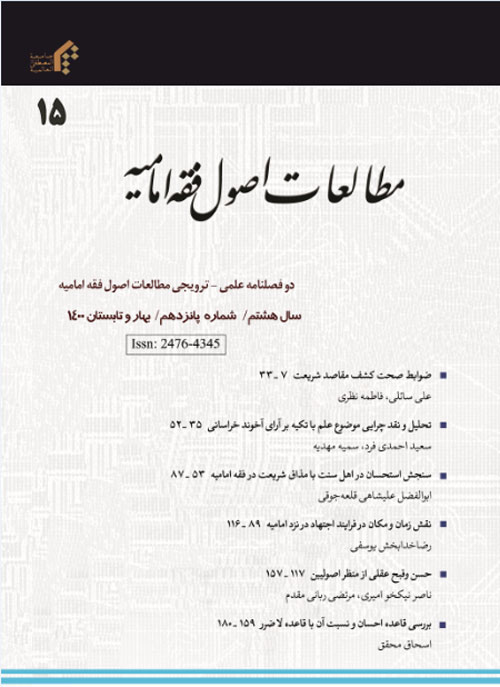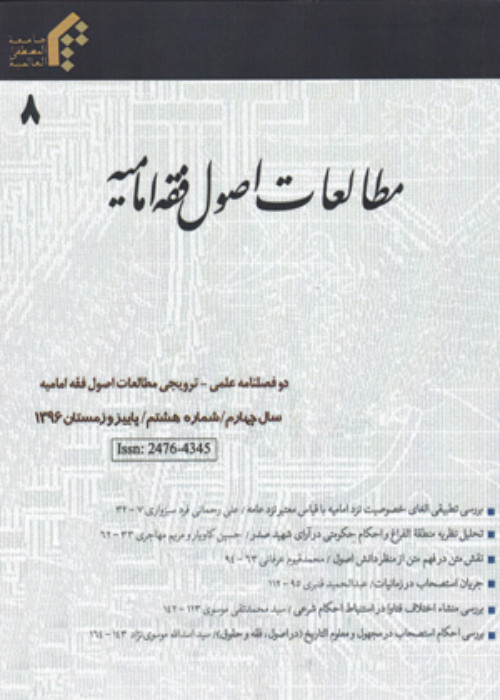فهرست مطالب

نشریه مطالعات اصول فقه امامیه
پیاپی 15 (بهار و تابستان 1400)
- تاریخ انتشار: 1401/01/25
- تعداد عناوین: 6
-
-
صفحات 7-33
-
صفحات 89-116
-
صفحات 117-157
-
صفحات 159-180
-
Pages 7-33
Maqāṣid al-Sharīʿa may be stated simply as the higher objectives of the rules of the Sharī’a, the observance of which, facilitate the normal functioning of society by enhancing the public good (maṣlaḥa). This implies avoiding actions which are likely harmful to individuals and society. The niyyah (intent), objective and purpose is simply to achieve goals that embody social and economic justice as well as enhance the welfare of the community and environment. In order to achieve the objectives of Sharīʿa from the verses and narrations, there should be certain rules and limits which not only edifty the discovered objectives but also blocks the path of personal taste and deduction. To help achieve this goal, in the present research, which has been carried based on library resources, four criteria for the accuracy of the discovered purposes have been presented in order to be used as the scale for measurement. These criteria are: 1. Compliance with the supreme goal of the Shari'a, i.e. servitude. To this end, all the goals and plans of human life must be in accordance with servitude as well as aimed at achieving it. 2. Non-contradiction of the discovered objective with valid verses and narrations, because these contradictions will divert it from the purpose of Shari'a. 3. Lack of internal discrepancy between goals; 4. Observance of public interests.
Keywords: objectives, rules, objectives of Sharīʿa, criteria, discoveryand terms of discovery -
Pages 35-52
For a long time, there has been a debate among experts and thinkers about whether or not a branch of science should have a subject. Legal theorists (Uṣūlī), like logicians and philosophers, have expressed their thoughts in this field. The late Ᾱkhund al-Khurasānī is one of the great scholars of science who has given his opinion taking the issue of having any scientific discipline as an evident and indisputable matter. According to what has been attributed to him, he has used the "Axiom of the One Effect" (qāʿida al-wāḥid maʿlūlī) as a proof of his claim. An examination of other experts' opinions also points to the two reasons, namely "the distinction of sciences" and "division of sciences into real and mentallyposited" (iʿtibārī) along with the "Axiom of the One Effect" as the evidence for the necessity of each science having a subject. The late Ᾱkhund al-Khurasānī not only maintains that every science should have a subject but he also says that the subject should be single and allencompassing. All three reasons can be criticized. According to the author, subject refers to a certain matter and it does not mean that subject should be single and encompassing. In other words, it is not necessary that the subject-matters of the issues be essentially united with each other or that they should form a single entity. It is enough to have a form of relationship. In other words, there need to be an abstract common axis with which the issues are related.
Keywords: single subject, one effect, typicality law -
Pages 53-87
One of concerns of Imami jurists over the past many centuries has been to derive rules using various legal ways and methods. They have sometimes used specific arguments and other times general arguments to infer and deduce Islamic laws. However, they do not seem to have contented themselves with these two methods of deduction inasmuch as they have used the Legislator's characteristics, methods and behaviors to attain a principle which transcends the rules; it is a principle that allows them to prove or disprove a ruling in a definite way. They have taken those principles not from single propositions, but from a collection of rulings and have chosen the "taste of Sharīʿa" as a title for it. In Sunni jurisprudence, however, Istiḥsān (juristic preference) has been proposed as one of the ways to discover the rules of Sharia, a method that is not regarded as a valid tool of derivation of Islamic laws in Shiite jurisprudence. Although the Shiite School of jurisprudence has opposed it, it has agreed with Ahl-e Sunnah about the manifestations. Those instances are not mentioned as istiḥsān, yet they can be considered as another manifestation of some definitions of Sunni juristic discretion (istiḥsān) —i.e., the use of a jurist's own judgment to determine the best solution to a religious problem that cannot be solved by simply citing sacred texts. Comparing the two terms of istiḥsān and taste (madhāq) of Shari'a, the present study has reached the conclusion that although these two terms have commonalities, they are different in many ways that make the taste of Shari'a authoritative and a valid instrument used by prominent Imami jurists in jurisprudential arguments.
Keywords: Istiḥsān, taste of Sharia, Sunni jurisprudence, Imamijurisprudence -
Pages 89-116
The temporal and spatial circumstances are causing many metamorphic changes in the world. The role of time and space in the process of ijtihād according to Imamiyya School of jurisprudence is a key concern in this study. The answer to the question regarding the role of time and space is based on the theoretical framework of balance (I'tidāl) concerning the role of time and place in ijtihād in the sense that some rules are beyond time and space. Thus, they are immutable and fixed as they do not change with the change of time and space. Meanwhile, there are certain rules that change subject to the time and space. These changes take place in line with preserving those permanent and unchanging rules. These changes can be expressed in two positions: 1. The position of the essence of the subject that serves a prelude to the derivation of a ruling. Before inferring the ruling, the jurist makes sure he knows the subject from the evidence and also identifies the external subject of the time of inference. 2. The position of the application of the general subject to the external manifestation, which in many cases, like political and judicial affairs, is the duty of the qualified jurist. In fact, rulings are timeless and metageographical, and what changes within a span of time or at a given space are external matters.
Keywords: Ijtihād, time, place, knowledge of subject, fixed andvariable, and instance -
Pages 117-157
The issue of good and bad (ḥusn and qubḥ) is very important in sciences such as theology and philosophy inasmuch as some very key doctrinal and moral issues are related to it (rational good and bad). Something being good or bad, the belief in the Hereafter or God being just etc are among the issues that are based on the concept of ḥusn and qubḥ. This issue has been debated and dealt with by Muslim and non-Muslim scholars since the middle of the first century AH. However, since many issues of ʿIlm al- Uṣūl (legal theories) are based on the issue of good and bad, the scholars of legal theories have scrutinized this topic on various occasions. What is discussed in this article is the opinion of Uṣūlīs, Ash'arites, Akhbaris and philosophers about whether good and bad are rational and essential. For example, is something good because God has said that it is good or it is good in and of itself? The divine command theory is a matter of contention and controversy and it has, finally, been proved that good and bad are rational. In this article, many sources dealing with legal theories have been referred to and the books used are mostly authored by early Muslim scholars and non-contemporaries. However, the opinions of contemporary and more recent scholars have also been studied and taken into consideration.
Keywords: intellect, the wise, good, bad, intrinsic, real matters, and actual matters -
Pages 159-180
The principle of benevolence (Iḥsān) is one of the highly practical juridical rules in Islamic jurisprudence and law. Many verses from the Qur'an and narrations point to this rule. In addition, the jurisprudential and legal application of this rule has an effective and important role in the field of ethics and social affairs. Also, the 'principle of no harm' (qāʿid lā ḍarar) is one of the general and practical rules of jurisprudence and law that no jurist or legal expert can follow without knowing all the rules of jurisprudence and especially these two rules. The scope of the rules of benevolence (qāʿida iḥsān) and the principle of no harm are universal in relation to our daily life and social affairs. The logical relationship between the two rules and the conflict resolution in this regard, assuming that they reconcile with each other and the method of resolving fundamental conflict such as particularization, overruling (ḥukūmat) and wurūd (lit. overriding) are some of the cases that will enhance their practical dimension. In this article, an attempt has been made to clarify the position concerning the principle of benevolence and its relation with the principle of no harm from a logical and principled point of view.
Keywords: Principle of benevolence (Iḥsān), principle of no harm, medical guarantee, lost object, civil liability


